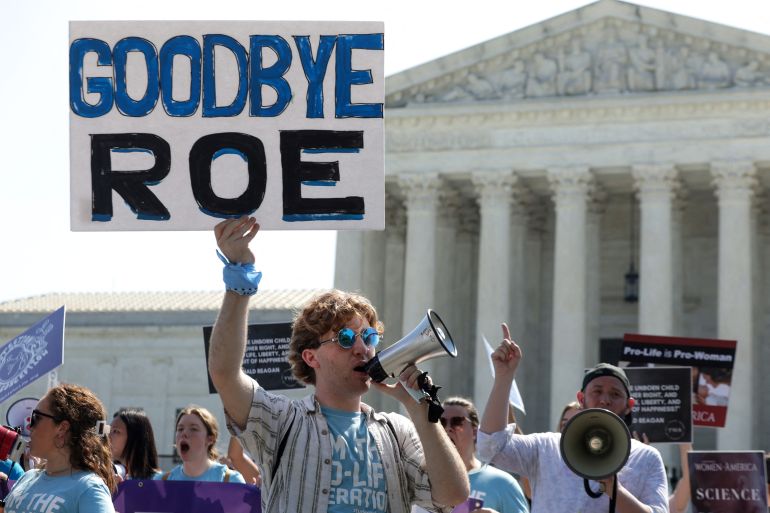Iowa Supreme Court clears path for state abortion ban
The court, now comprised almost entirely of conservatives, reverses a decision by the same body just four years earlier.

The Iowa Supreme Court, the state’s highest judicial authority, ruled that the state’s constitution does not guarantee the right to an abortion, paving the way for legislators to severely limit or ban abortions if federal protections are lifted.
The decision, issued Friday, invalidates a ruling by the same body just four years earlier that found that abortion is a fundamental right guaranteed by both Iowa and federal law. The court has grown more conservative in the years since, and is now composed almost entirely of Republican appointees, according to The Associated Press.
Keep reading
list of 3 itemsOklahoma signs into law US’s strictest abortion legislation
The major cases still before the US Supreme Court
The ruling is the latest in a salvo of attacks on the right to an abortion in the US, with conservatives anticipating the end of Roe v Wade, the landmark Supreme Court decision that legalised abortion across the US.
With today’s conservative-dominated Supreme Court likely to reverse that ruling, the decision by the Iowa Supreme Court paves the way for the criminalisation of abortion in the state in the event that Roe is struck down, without the more complicated step of amending the state constitution.
“I want to be very clear that abortion is still safe and legal in Iowa, even after today’s Court decision,” Sarah Stoesz, president and CEO of Planned Parenthood North Central States, said in a statement on Friday.
“We are deeply disappointed that the Iowa Supreme Court is abandoning women in spite of overwhelming support for abortion access. Although it is a sad day, we are here for our patients to ensure they can receive the critical care that they need.”
The decision is the result of a lawsuit by abortion providers who challenged a 2020 law that made abortion access more restrictive by imposing a 24-hour waiting period for people who want to get an abortion.
A judge ruled in favour of the group and against that law, citing the high court’s 2018 ruling that declared abortion a fundamental right guaranteed by the Iowa constitution. The 2018 decision was made with a 5-2 majority, and stated that “autonomy and dominion over one’s body go to the very heart of what it means to be free.”
Four years later, the political landscape has changed. The state’s conservative Governor Kim Reynolds, a vehement opponent of abortion rights, has named four new justices in the last five years, and six of the seven justices on the court have been appointed by Republican governors. Iowa, a key swing state in US elections, voted for Donald Trump in 2016 and 2020.
Reynolds and conservative allies in the state legislature have expressed their hope that the court would strike down the 2018 decision, and towards that end moved to consolidate control over the panel that chooses court nominees in the hands of the governor. Reynolds took to Twitter to praise the court’s decision, saying “Today’s ruling is a significant victory in our fight to protect the unborn.”
With basic abortion rights broadly popular in the US, conservatives have focused on the courts, relatively insulated from public outrage, to push their attacks against abortion.
Sami Scheetz, a Democratic candidate for the state legislature in Iowa, told Al Jazeera in a statement over email that, “This decision is an attack on women – plain and simple … Lawmakers have no place interfering in someone else’s decisions about pregnancy, abortion, or when they want to start a family.”
The 2018 ruling had added Iowa to a list of five other states where abortion was declared a right by a state’s high court, the others being Alaska, Florida, Kansas, Montana and Minnesota.
Such rulings could pose a challenge to conservatives in those states eager to take away the right to abortion if the US Supreme Court strikes down Roe v Wade, which would leave the right to an abortion up to individual states.
Florida adopted a law this year that bans abortions after 15 weeks – a period before which many women know they are pregnant. Abortion advocates have said they will challenge it.
Reynolds has said she is “proud” of a bill she signed into law in 2018 that banned abortion as early as six weeks, a period when many are still not aware that they are pregnant. The bill included exceptions for rape, incest, and situations when the life of the mother is endangered.
However, Reynolds has not made clear whether such exceptions would be in place if Iowa were to ban abortion following the reversal of Roe. According to The AP, Reynolds recently told reporters “I’m not going to set any parameters.”